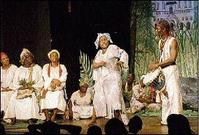Andre Jebbinson, Staff Reporter
Music and movement are an integral part of the tale of freedom, as seen in the 2006 production of 'Augus Mawnin'. - Winston Sill/Freelance Photographer
In 1997 when the celebration of Emancipation Day was restored to the Jamaican calendar, Augus Mawnin' also became a fixture on the theatre calendar.
"There was a lot of emotion about it. People thought we shouldn't be talking about slavery. Brian (Heap) said to me, 'Let us come up with something to present as a celebration of the return of the first of August,' " said Barbara Gloudon, who wrote the play.
In 1962, when Jamaica gained independence, Emancipation Day was set aside to avoid the confrontation of a period in black history that was quite unpleasant.
That decision was reversed 10 years ago when then Prime Minister, P.J. Patterson followed through on a recommendation of the Committee on National Symbols and National Observances to reinstate the day. A few others Caribbean countries followed suit.
Emancipation Day recognises when men, women and children were finally freed of the oppressive social and economic systems in which they were treated as less than human.
"When my colleague Brian Heap and I came up with this idea, it was to create a play that every year on August 1, somebody can say to somebody, 'Have you ever seen Augus Mawnin'? Let me carry you guh show you,' " Gloudon said.
Hear 'Freedom Paper' read
In the play, a group of slaves, eager to hear the 'Freedom Paper' read, run away from the plantation to find 'Augus Mawnin'.
They stumble upon a hut in the depths of a cane piece where Yemojah, an old woman who can tell the story of the ancestors' lives.
She gives shelter to the runaways when 'backra sojah' come in search of them and then she and the group decide to have a setup (wake) in anticipation of slavery's passing.
In the tradition of the ancestors, they pass the time with songs, dance, laughter and sharing of their life experiences. They act out some of their history and the foibles of backra and mistresses, whose lives and theirs are intertwined.
Little by little, they move closer to Augus Mawnin', and then they are there to hear Freedom Paper read. As soon as they hear the word 'free', for which they have waited all their lives, they launch into celebration, drawing upon the rhythms and spirit of their ancestral heritage.
As Gloudon explained, the concept of doing one work over and over is something many Jamaicans cannot really fathom. But in many other nations, seaonal rituals are common theatrical productions.
"People come to it because it represents the spirit of the season ... As it becomes more familiar, it takes on more meaning," Gloudon said.
Augus Mawnin' is a collection of songs and poems that tells the story about the struggles of cutting cane and the harsh treatment meted out to slaves. Many other issues are woven into conversations and situations, as the house slaves saw themselves as better than the field slaves.
Class differences
The house slaves spoke standard English like their masters, but in an exaggerated form. The hand-me-downs they wore from the masters and mistresses separated them from the field slaves who, of course, wore rags. Then there is Brown Bessy, who thinks her status is elevated because she is light-skinned.
"We can never forget; it will always be around. (The younger) generation is not freed of slavery, because the very thing that was set up in that exploitation - class differences - all ofthat is there. It's there for the young to come and see. After a while, you begin to recognise it and say, 'That has happened to me or somebody I know,' " Gloudon said.
There are also slight sexual innuendoes, like the line that says "Backra mongoose love slave fowl coop, yuh si how much brown people deh bout? A backra mongoose mek it".
Augus Mawnin' also incorporates allegoric messages such as when people find themselves trapped in tight spaces and, by the end of the scene, there is a physical fight and struggle for space. There is also talk of reparation when one old woman demands that "dem fi pay wi fi everything dem tek weh from wi".
Masters gave the slaves whatever names they felt like. It was poet Lorna Goodison who said, "a name is the first thing we have in this world". Its symbolism goes even further. These are topics, Gloudon says, which will always be relevant.
"Jamaican theatre is now in a strange place. It has cut ties with influences which enrich. What is the message for 2007? The message is always timeless," she said.
These are some of the themes the play will try to capture on August 1. Also, instead of showing the play in the theatre, a stage will be constructed outside the Little Theater, after which each patron will be given a cup of rich Jamaican cocoa.
The turnout over the years has been enough to cover production costs. With this showing being the 10th anniversary, it is possible it will be the last, Gloudon hints, but the memories will still live on.

